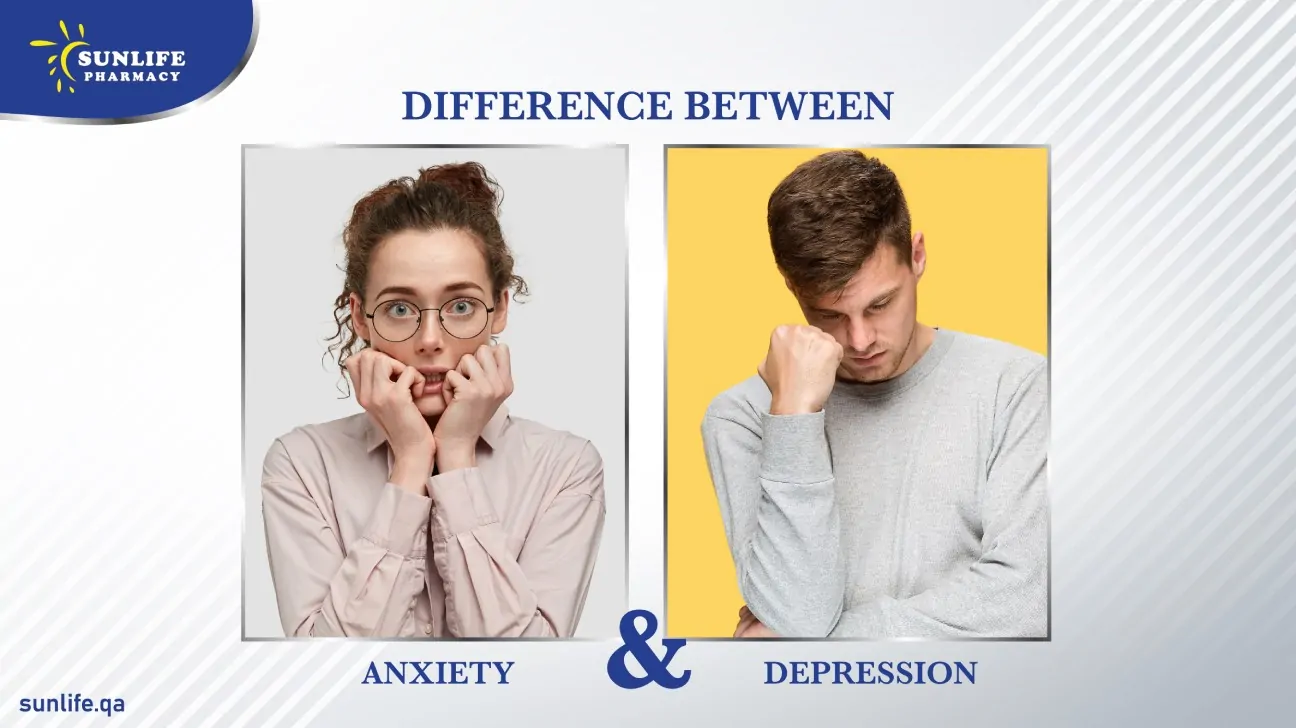Difference between Anxiety and Depression

Anxiety and depression are types of mood disorders. Among other things, depression causes feelings of sadness, hopelessness, and reduced energy. Anxiety creates feelings of nervousness, worry, or dread. Although the two conditions are different, you can have both at the same time. Agitation and restlessness can also be a symptom of depression.
It’s normal to have feelings of anxiety or depression from time to time. But when these feelings happen often and they interfere with your life, you might have a disorder that is treatable.

Understand your emotions
Your symptoms can help your doctor figure out which of these two conditions you have, or if you have both. Some of the same treatments work for anxiety and depression.
What Is Depression?
Depression affects how you feel and act. When you’re depressed, you may have symptoms like:
- Sadness, hopelessness, or anxiousness
- A loss of interest in things you once enjoyed
- A lack of energy
- Eating more or less than you used to
- Sleeping too little or too much
- Trouble thinking or concentrating
For your symptoms to be considered depression, you need to have them most of the day, almost every day, for at least 2 weeks. And they shouldn’t have a medical cause, like a thyroid problem. Your doctor can check you for medical conditions that cause depression symptoms.
What Is Anxiety?
Worry and fear are normal parts of life. But when these feelings don’t go away or they’re excessive, they can be signs of an anxiety disorder.
You may have a problem with anxiety if you often feel:
- Overwhelmed by worry
- Cranky or on edge
- Sweaty or shaky
- Like you’re out of control
There are a few types of anxiety disorders, each with its own symptoms.
Generalized anxiety disorder is when you worry about many different things.
Social anxiety disorder is excessive worry when you’re around other people.
Panic disorder causes sudden feelings of fear, with symptoms like chest pain and a pounding heart.
Phobias are intense fears of places or things, like closed spaces or animals.
How Are They Different?
The main difference between depression and anxiety is the symptoms. Depression is a persistent feeling of sadness. You also have no energy and you lose interest in activities you once loved. Some people with depression think about hurting themselves.
Anxiety involves fear or worry that you can’t control. Depending on the type of anxiety you have, the worry can surface during everyday activities like meeting new people.
How Are They Related?
Both depression and anxiety are very common and often happen together. About 60% of people with anxiety also have symptoms of depression, and vice versa. Each condition can make symptoms of the other get worse or last longer.
The same genes may be behind both conditions. Anxiety and depression could also stem from the same structures or processes in the brain. Stress and trauma early in life can trigger both depression and anxiety.
If you have anxiety, you may be at greater risk for depression. Experts say avoiding the things you fear might lead to depression.
How Do You Treat Depression and Anxiety?
It can be harder for doctors to diagnose and treat depression and anxiety when they happen together. That’s why it’s important to tell your doctor about all of your symptoms.

Is it Anxiety or Depression?
The treatment for both anxiety and depression involves talk therapy, medication, or a combination of the two. Cognitive behavioral therapy (CBT) is one of the main talk therapies. It teaches you how to think and behave differently to stop triggering your anxiety or depression.
Antidepressants are medicines that treat depression. They change the balance of chemicals in your brain to improve your mood. Anti-anxiety drugs, antidepressants, and beta-blockers are treatments for anxiety.
The sooner you start treatment, the more likely it will help you. Let your doctor know if the treatment you’re on doesn’t relieve your symptoms or if it causes side effects. It may take a few tries to find the treatment that works best for you.


